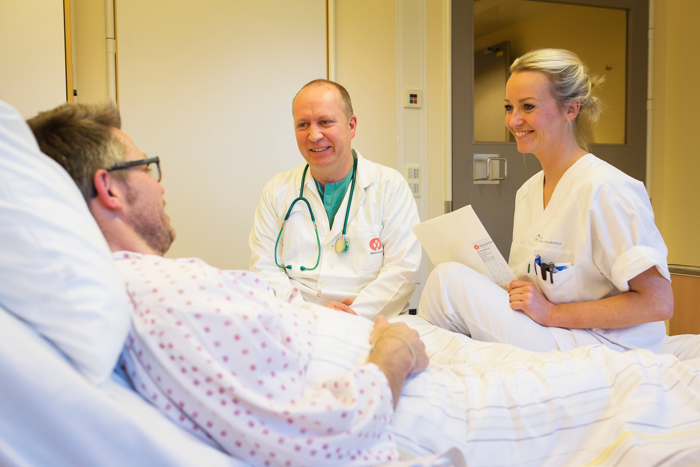What are clinical trials?
Clinical trials are studies conducted on human subjects to investigate the effect of various treatment methods. Examples include
- new pharmaceuticals
- surgical methods
- special diets
- the use of medical devices
The aim of clinical trials is to increase knowledge of
- diseases that can affect us
- the effect of various forms of treatment
- side effects of treatment
- the best treatment
The way in which the clinical trials are implemented, how long they run for and what they entail for research subjects will vary between clinical trials.
Researchers can ask to use information from patients’ medical records in clinical trials. Further information is usually also collected about the research subjects and samples of blood, urine or other biological materials are often taken.
How to participate in a clinical trial
No-one is entitled to participate in a clinical trial and there may not be a suitable clinical trial for you and your disease. An overview of ongoing clinical trials in Norway can be found by clicking in the box below or on the websites of all Norwegian hospitals.
In order for you to be considered as a research subject in a clinical trial, your doctor needs to submit a request to the hospital responsible for the clinical trial. You need to meet the criteria that have been set by researchers to select patients for their clinical trials. These criteria may include:
- diagnosis
- age
- test results, for example blood test results
- previous diseases
- current medication
Criteria such as these are important for ensuring the safety of research subjects and ensuring that the data and results collected are comparable and suitable for providing answers to the questions addressed by the clinical trial.
Advantages and disadvantages of being a research subject
If you are offered the opportunity to participate in a clinical trial, you need to carefully consider what it would entail. A clinical trial may require time and effort, as participation will often involve more check-ups, tests and samples than would be the case in connection with ordinary treatment.
The treatment you receive during the clinical trial could lead to side effects, both serious and less serious. Identifying such side effects is an important aspect of clinical trials. New pharmaceuticals can cause unexpected side effects. Those who are responsible for the clinical trial will be notified of known side effects and any side effects detected throughout the clinical trial. They will ensure that you receive information about any newly discovered side effects. If you experience side effects due to the treatment, these will be monitored and managed to the extent possible so that you are not exposed to any unnecessary risk.
Participating in a clinical trial may provide you with access to the latest and most advanced treatment before it becomes available to the rest of the population. If you participate in a randomised clinical trial, the treatment you receive will be based on randomly drawn lots. The purpose of such clinical trials is usually to compare the experimental treatment with the best available routine treatment, i.e. the treatment you would have been given if you were not participating in the clinical trial. Some clinical trials compare new treatment with ineffective drugs, known as placebos.
As a research subject, you will be closely monitored by the responsible doctor and nurse. Even if the new treatment method does not help you, the results of the clinical trial could still help other patients with the same disease in the future.
After being invited to participate
Anyone who has been pre-assessed as meeting the criteria for participating as a research subject in a clinical trial will be invited to a meeting with the persons responsible for the clinical trial.
During the meeting, you will receive verbal and written information about:
- the purpose of the clinical trial
- the duration of the clinical trial
- the samples and tests that will be taken
- the potential positive effects of the clinical trial
- the potential side effects that may occur
- who is responsible for the clinical trial
You will be asked to sign a declaration stating that you have received information about the clinical trial and that you consent to participate as a research subject. Your signature does not entail any obligation and you may withdraw from the clinical trial at any time without providing a reason.
Occasionally, the people responsible for the clinical trial need to conduct additional investigations to determine whether you meet the criteria for participating. You can ask those responsible for the clinical trial if you have any questions. It is important that you feel confident you will receive thorough answers.

Clinical trials – Terms and participant rights
If you participate in a clinical trial in Norway, you have the right to withdraw at any time, be informed of any changes in the trial, and more.
Illustration: Viktor Cap / Mostphotos
Who conducts clinical trials?
Several doctors throughout the country will often collaborate on a clinical trial. Some clinical trials may run in several countries at the same time. A clinical trial of a pharmaceutical will often be conducted in collaboration with the company that developed the drug and healthcare professionals at hospitals. Clinical trials are conducted in accordance with strict rules.
Who approves clinical trials
All medical research projects that involve people, biological material from people or health data must be approved by the Regional Committee for Medical and Health Research Ethics (REC)(in Norwegian). All clinical trials involving pharmaceuticals or medical devices must also be approved by the Norwegian Medicines Agency.
Clinical trials abroad
- Overview of clinical trials in the Nordic countries (nordforsk.org)
- Nordic NECT - Nordic Network for Early Cancer Trials (nordicnect.org)
- A user-friendly platform for finding clinical trials worldwide (findmecure.com)
- Database of privately and publicly funded clinical studies around the world (clinicaltrials.gov)
